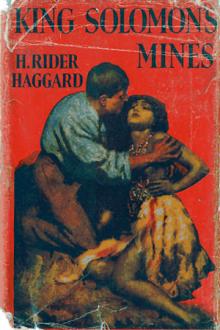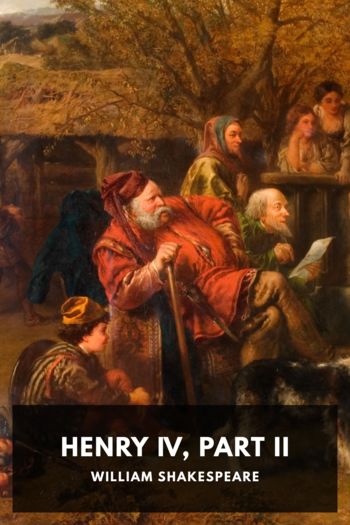King Solomon’s Mines, H. Rider Haggard [best mystery novels of all time TXT] 📗

- Author: H. Rider Haggard
Book online «King Solomon’s Mines, H. Rider Haggard [best mystery novels of all time TXT] 📗». Author H. Rider Haggard
Filing through the kraal gate, we marched across the open space to where the ex-king sat. When within about fifty yards of him the regiment was halted, and accompanied only by a small guard we advanced towards him, Gagool reviling us bitterly as we came. As we drew near, Twala, for the first time, lifted his plumed head, and fixed his one eye, which seemed to flash with suppressed fury almost as brightly as the great diamond bound round his forehead, upon his successful rival—Ignosi.
“Hail, O king!” he said, with bitter mockery; “thou who hast eaten of my bread, and now by the aid of the white man’s magic hast seduced my regiments and defeated mine army, hail! What fate hast thou in store for me, O king?”
“The fate thou gavest to my father, whose throne thou hast sat on these many years!” was the stern answer.
“It is good. I will show thee how to die, that thou mayest remember it against thine own time. See, the sun sinks in blood,” and he pointed with his battle-axe towards the setting orb; “it is well that my sun should go down in its company. And now, O king! I am ready to die, but I crave the boon of the Kukuana royal House9 to die fighting. Thou canst not refuse it, or even those cowards who fled today will hold thee shamed.”
“It is granted. Choose—with whom wilt thou fight? Myself I cannot fight with thee, for the king fights not except in war.”
Twala’s sombre eye ran up and down our ranks, and I felt, as for a moment it rested on myself, that the position had developed a new horror. What if he chose to begin by fighting me? What chance should I have against a desperate savage six feet five high, and broad in proportion? I might as well commit suicide at once. Hastily I made up my mind to decline the combat, even if I were hooted out of Kukuanaland as a consequence. It is, I think, better to be hooted than to be quartered with a battle-axe.
Presently Twala spoke.
“Incubu, what sayest thou, shall we end what we began today, or shall I call thee coward, white—even to the liver?”
“Nay,” interposed Ignosi hastily; “thou shalt not fight with Incubu.”
“Not if he is afraid,” said Twala.
Unfortunately Sir Henry understood this remark, and the blood flamed up into his cheeks.
“I will fight him,” he said; “he shall see if I am afraid.”
“For Heaven’s sake,” I entreated, “don’t risk your life against that of a desperate man. Anybody who saw you today will know that you are brave enough.”
“I will fight him,” was the sullen answer. “No living man shall call me a coward. I am ready now!” and he stepped forward and lifted his axe.
I wrung my hands over this absurd piece of Quixotism; but if he was determined on this deed, of course I could not stop him.
“Fight not, my white brother,” said Ignosi, laying his hand affectionately on Sir Henry’s arm; “thou hast fought enough, and if aught befell thee at his hands it would cut my heart in twain.”
“I will fight, Ignosi,” was Sir Henry’s answer.
“It is well, Incubu; thou art a brave man. It will be a good fray. Behold, Twala, the Elephant is ready for thee.”
The ex-king laughed savagely, and stepping forward faced Curtis. For a moment they stood thus, and the light of the sinking sun caught their stalwart frames and clothed them both in fire. They were a well-matched pair.
Then they began to circle round each other, their battle-axes raised.
Suddenly Sir Henry sprang forward and struck a fearful blow at Twala, who stepped to one side. So heavy was the stroke that the striker half overbalanced himself, a circumstance of which his antagonist took a prompt advantage. Circling his massive battle-axe round his head, he brought it down with tremendous force. My heart jumped into my mouth; I thought that the affair was already finished. But no; with a quick upward movement of the left arm Sir Henry interposed his shield between himself and the axe, with the result that its outer edge was shorn away, the axe falling on his left shoulder, but not heavily enough to do any serious damage. In another moment Sir Henry got in a second blow, which was also received by Twala upon his shield.
Then followed blow upon blow, that were, in turn, either received upon the shields or avoided. The excitement grew intense; the regiment which was watching the encounter forgot its discipline, and, drawing near, shouted and groaned at every stroke. Just at this time, too, Good, who had been laid upon the ground by me, recovered from his faint, and, sitting up, perceived what was going on. In an instant he was up, and catching hold of my arm, hopped about from place to place on one leg, dragging me after him, and yelling encouragements to Sir Henry—
“Go it, old fellow!” he hallooed. “That was a good one! Give it him amidships,” and so on.
Presently Sir Henry, having caught a fresh stroke upon his shield, hit out with all his force. The blow cut through Twala’s shield and through the tough chain armour behind it, gashing him in the shoulder. With a yell of pain and fury Twala returned the blow with interest, and, such was his strength, shore right through the rhinoceros’ horn handle of his antagonists battle-axe, strengthened as it was with bands of steel, wounding Curtis in the face.
A cry of dismay rose from the Buffaloes as our hero’s broad axe-head fell to the ground; and Twala, again raising his weapon, flew at him with a shout. I shut my eyes. When I opened them again it was to see Sir Henry’s shield lying on the ground, and Sir Henry himself with his





Comments (0)